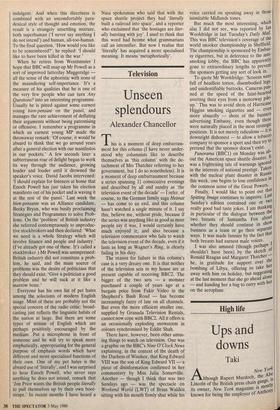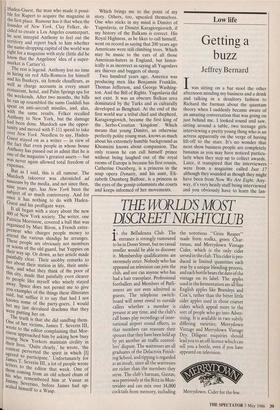High life
Ups and downs
Taki
New York Although Rupert Murdoch, the Abe Lincoln of the British press chain gangs, Is its owner, New York magazine is mostly known for being the employer of Anthony Haden-Guest, the man who made it possi- ble for Rupert to acquire the magazine in the first place. Rumour has it that when the founder of New York, Clay Felker, de- cided to create a Los Angeles counterpart, he sent intrepid Anthony to feel out the territory and report back to him whether the name-dropping capital of the world was right for a magazine with style (little did he know that the Angelinos' idea of a super- market is Cartier's). The rest is legend. Anthony lost no time in hiring six red Alfa-Romeos for himself and his flunkeys, six female chauffeurs, as well as charge accounts in every smart restaurant, hotel, and Palm Springs spa for the weekends. After two months, the bills he ran up resembled the sums Gaddafi has spent on anti-aircraft missiles, and, alas, With the same results. Felker recalled Anthony to New York, but the damage had been done. Murdoch saw the oppor- tunity and moved with F-111 speed to take over New York. Needless to say, Haden- Guest stayed on as a writer — in view of the fact that even people in whose house Anthony has passed out in admit that he is one of the magazine's greatest assets — but was never again allowed total freedom of expenses.
But as I said, this is all rumour. The Murdoch takeover was chronicled ad • nauseam by the media, and not since then, nine years ago, has New York been the subject of so much controversy. And for once it has nothing to do with Haden- Guest and his profligate ways. It all began with a story about the new 400 of New York society. The writer, one Patricia Morrisroe, covered a ball that was organised by Marc Biron, a French entre- preneur who charges people money to attend the various shindigs he arranges. These people are obviously not members or scions of the old guard, but Yuppies on their way up. Or down, as her article made Painfully clear. Their snobby remarks to her about their station in life, their ambi- tion, and what they think of the poor of this City, made that painfully even clearer to people like myself who wisely stayed away. Space does not permit me to give YOU examples of the things these illiterates said, but suffice it to say that had I not known some of the party-goers, I would bet my last devalued drachma that they were putting her on. The truth is that she did sandbag them. One of her victims, James T. Severin III, wrote to the editor complaining that Mor- risroe approached him by asking how busy Young New Yorkers maintain civility in their lives. 'Quite clearly,' he wrote, 'the context perverted the spirit in which [I] agreed to participate.' Unfortunately for James T. Severn III, a lot of people wrote letters to the editor that week. One of them coming from an old school chum of his who remembered him at Vassar as Jimmy Severino, before James had up- scaled himself to a Wasp. Which brings me to the point of my story. Others, too, upscaled themselves. One who sticks in my mind is Dimitri of Yugoslavia, or Dimitri Karagiorgiovich, if my history of the Balkans is correct. His Royal Highness, as he likes to call himself, went on record as saying that 200 years ago Americans were still climbing trees. Which may be music to the ears of all those American-haters in England, but histor- ically is as incorrect as saying all Yugoslays are thieves and buggers of sheep.
Two hundred years ago, America was producing men like Benjamin Franklin, Thomas Jefferson, and George Washing- ton. And the Bill of Rights. Yugoslavia did not exist. It was an obscure Balkan area dominated by the Turks and as culturally developed as Benghazi. At the end of the first world war a tribal chief and shepherd, Karagiorgiovich, became the first king of the _ Serbo-Croatian 'kingdom'. Which means that young Dimitri, an otherwise perfectly polite young man, knows as much about his extremely humble background as Khomeini knows about compassion. The only reason he can call himself prince without being laughed out of the royal rooms of Europe is because his first cousin, Catherine Oxenberg, is a princess in the soap opera Dynasty, and his aunt, Eli- zabeth Oxenberg Balfour, is a princess in the eyes of the gossip columnists she courts and keeps informed of her movements.



















































 Previous page
Previous page